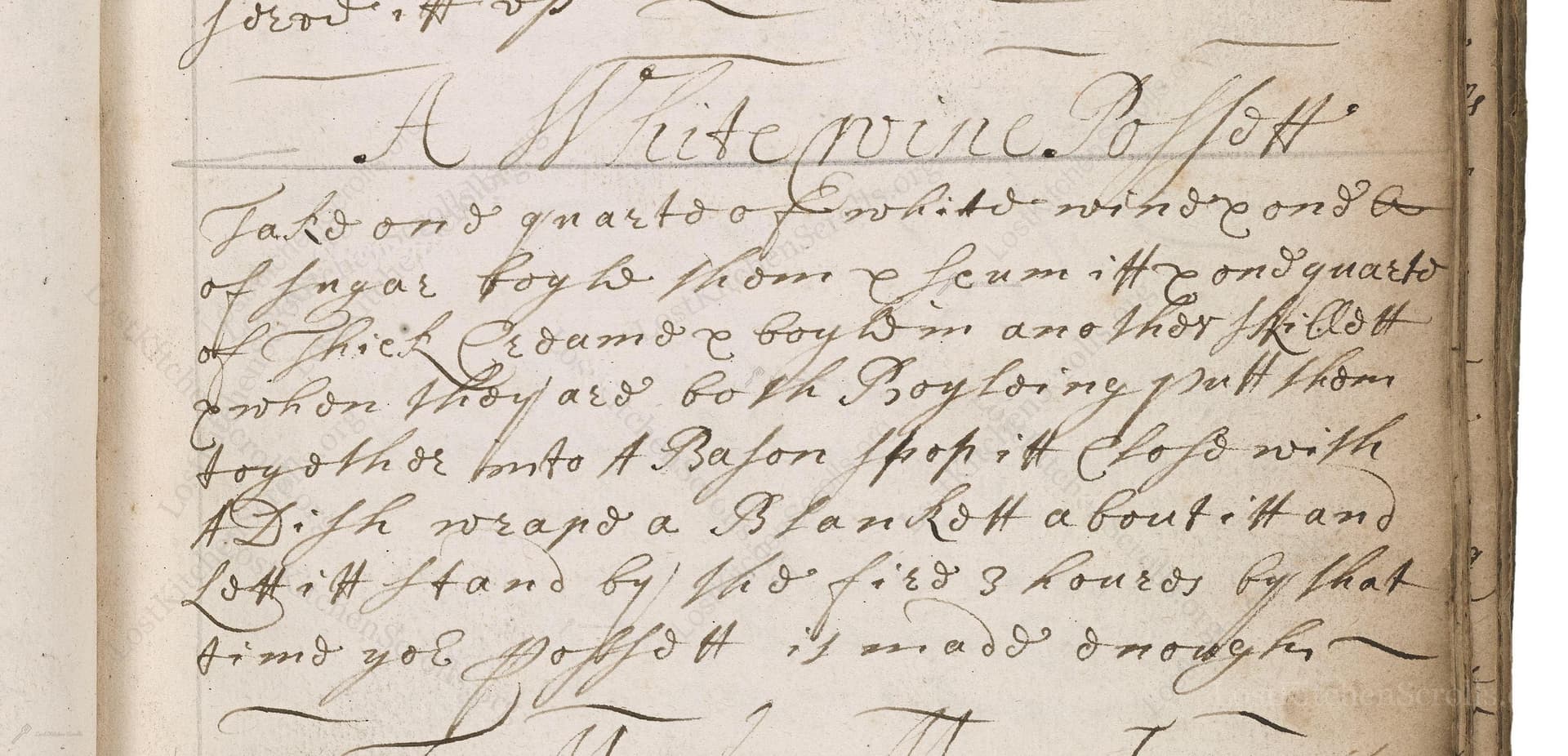A White Wine Possett
From the treasured pages of Cookbook of Ann Smith, Reading
Written by Ann Smith

A White Wine Possett
"Take on d quartd of white wine & on qart of sugar boyle them & Scum it & on d quart of thick Creame & boyle another Bill & then when they are both boyling putt them together into A Bason stop it Close with A Dish wrapt a Blankett about it and Let it Stand by the fier 3 houres by that time you possitt is made enough"
Note on the Original Text
This recipe, like many from the late 17th century, is written with minimal quantities and directions, assuming the cook has experience and intuition. Spelling is variable ('quarte', 'boyle', 'bason'), reflecting phonetic norms of the time. Instructions are brief, omitting details we now expect, such as precise temperatures or times, except that 'three hours' is given for the resting. The original recipe also employs scumming (removing foam), a common historical step for clarity in syrups and infusions.

Title
Cookbook of Ann Smith, Reading (1698)
You can also click the book image above to peruse the original tome
Writer
Ann Smith
Era
1698
Publisher
Unknown
Background
Step into the sumptuous kitchens of 17th-century England with Ann Smith’s culinary treasury, where traditional recipes and time-honored techniques invite you to savor the flavors of history. Each page promises a feast of inspiration and a glimpse into the artful dining of a bygone era.
Kindly made available by
Folger Shakespeare Library
This recipe comes from Ann Smith, dating to 1698, a time when possets were beloved both as comforting nightcaps and as luxurious desserts at the English table. White wine posset is a less common variant, as richer sweetened ale or sack (a fortified wine) was more typical. The dish speaks to the ingenuity and resourcefulness in English kitchens of the late 17th century, using simple methods to create impressive layered desserts for festive occasions.

Historically, a large cauldron or saucepan would be used to heat both the wine and the cream, usually over an open hearth or fire. A sturdy bason or bowl (often ceramic or pewter) would hold the hot liquids. The covering dish would likely be earthenware, and the blanket would help to insulate the posset and slow the cooling, allowing the curd and whey to separate properly. No whisking or electric appliances—just careful handling and patience.
Prep Time
10 mins
Cook Time
3 hrs 10 mins
Servings
8
We've done our best to adapt this historical recipe for modern kitchens, but some details may still need refinement. We warmly welcome feedback from fellow cooks and culinary historians — your insights support the entire community!
Ingredients
- 1 quart dry white wine
- 1 1/4 cups granulated sugar
- 1 quart double (heavy) cream
Instructions
- Begin by combining 1 quart of dry white wine with 1 1/4 cups of granulated sugar in a saucepan.
- Bring this mixture to a gentle boil and skim off any foam that forms on the surface.
- Separately, in another pan, bring 1 quart of thick double cream to a boil.
- Once both mixtures are boiling, pour them together into a large heatproof bowl.
- Cover the bowl tightly with a plate, then wrap it in a thick blanket or towel to keep the heat in.
- Allow the bowl to sit near a warm spot (such as by the oven or a radiator) for 3 hours.
- After this time, your posset will have thickened and separated into layers, ready to be served.
Estimated Calories
515 per serving
Cooking Estimates
Preparation takes about 10 minutes, including measuring the ingredients and heating the cream and wine mixtures. Cooking time includes bringing both mixtures to a boil and then letting the posset sit for 3 hours to thicken and set.
As noted above, we have made our best effort to translate and adapt this historical recipe for modern kitchens, taking into account ingredients nowadays, cooking techniques, measurements, and so on. However, historical recipes often contain assumptions that require interpretation.
We'd love for anyone to help improve these adaptations. Community contributions are highly welcome. If you have suggestions, corrections, or cooking tips based on your experience with this recipe, please share them below.
Join the Discussion
Rate This Recipe
Dietary Preference
Main Ingredients
Culinary Technique

Den Bockfisch In Einer Fleisch Suppen Zu Kochen
This recipe hails from a German manuscript cookbook compiled in 1696, a time whe...

Die Grieß Nudlen Zumachen
This recipe comes from a rather mysterious manuscript cookbook, penned anonymous...

Ein Boudain
This recipe comes from an anonymous German-language manuscript cookbook from 169...

Ein Gesaltzen Citroni
This recipe, dating from 1696, comes from an extensive anonymous German cookbook...
Browse our complete collection of time-honored recipes



